The Horror Tree Presents…An Interview with Jason Franks
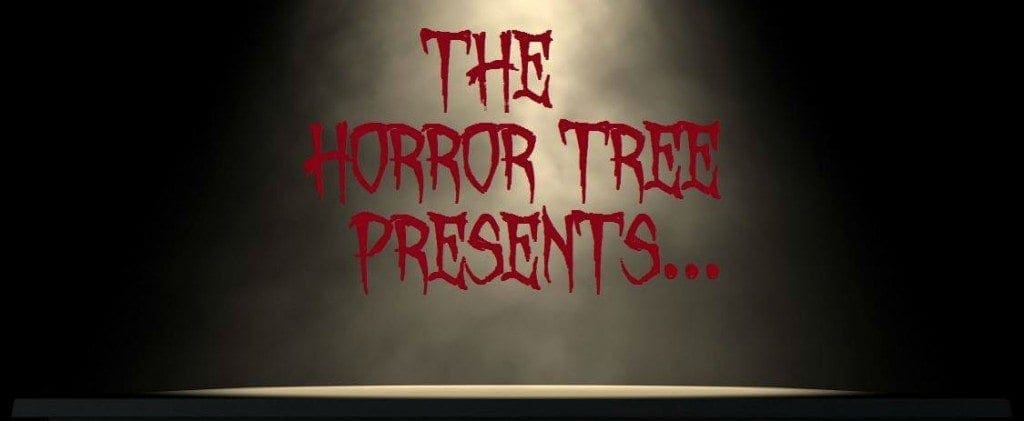
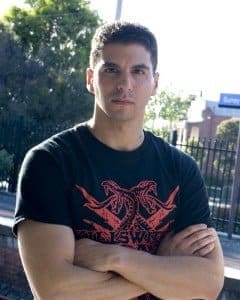 Scott – Your online bio mentions that you’ve lived in South Africa, the USA, Japan, and now Australia. With that in mind, I’ve got to ask: Which place did you like best and why?
Scott – Your online bio mentions that you’ve lived in South Africa, the USA, Japan, and now Australia. With that in mind, I’ve got to ask: Which place did you like best and why?
Jason – I’ve lived most of my life in Australia, and I guess I like it best here. My immediate family is based here now and I just like the low-key culture to which we aspire. Australians are casual, vulgar, and will ruthlessly mock anyone who we think is putting on airs.
I also love Japan. When we got married, my wife and I did consider living over there for a time, but it didn’t work out with the global economy the way it was.
Scott – Aspiringly low-key. I like that. How would you say that your past travels have had an influence on your literary work?
Jason – Hugely. I didn’t really consider myself an Australian until I had lived in the US for a few years. When Americans asked me where I was from, I’d say ‘Australia’, just to make it simple, and eventually, I realized it was true. In Australia, when people ask, I have to say South Africa . . . but I haven’t lived there since I was 10 and I don’t feel like a South African any more.
Travel’s not just about seeing the sights or getting away from the things you take for granted. I love being in transit, at least on the outbound side of things. As stressful as airports can be, it’s great to just be able to put aside your everyday concerns and just concentrate on getting to where you are going. I really do feel a weight coming off my shoulders when I finally sit down in a departure lounge and know there’s nothing I have to do but wait for my flight to be called. And then, once you arrive….
Being an outsider in a strange place is frightening and alienating and wonderful. It’s addictive.
I like to set stories in places I have visited. Sometimes I will visit places if I want to write about them. I am just now finishing up a new novel about a hitman whose employers send him to on missions to places that don’t exist — but who is really only in the game for the travel opportunities.
Scott – Having travelled quite a bit as well, I know what you mean about simplifying things to make it easier for everyone. However, when it comes to writing, it seems like you’ve got your fingers in a little bit of everything! I’ve talked to writers with English degrees and writers who came to the craft after years on the theatrical stage. How did you end up writing novels and teaching workshops?
Jason – Writing is something I’ve always done for pleasure; ever since I first learned how to make the alphabet. It’s something I always wanted to do. I did do a one-year graduate diploma in creative writing and I took classes at the local writing centre, and that lead directly to my first publications. That I think was fifty percent due to the skills I learned in class and fifty percent due to me feeling like I was not only qualified but obliged to spend more time writing and to start submitting stories to publications. In particular, the workshops I did with Jack Dann taught me not just craft of writing, but how to go about actually selling stories.
Writing grew out of that. I found that I wanted to tell longer stories or to write more stories about the same characters, and it was just a matter of trying until I found out how to do it. My first (awful, unpublishable) novel was basically an exercise in seeing if I could write a complete story about a group of characters (government agents and roaming psychopaths) in a situation (a serial killer—with mind powers!) that would go to novel length.
(Told you it was terrible.)
I never planned on teaching workshops. The first one I did was at the request of the Australian Society of Authors—they cancelled it at the last minute, and I admit I was relieved. But then the Australian Comic Arts Festival asked me to do one, and I figured I’d give it a shot. I was surprised that it went off well and, when Comics Mastermind approached me about working with them, I figured I could do it regularly.
Scott – You know, you say that’s a terrible plot for a novel, but I’ve seen what’s on television…. Speaking of serial killers, though, you prefer to explore the darker elements of speculative fiction. It seems like you prefer fairy tales to Lovecraftian horror or weird fiction. What’s so interesting to you about that niche?
Jason – I think there are a couple of things at play here. First is my desire to tell stories that are a bit different. Good triumphs over evil, the hero finds eternal love (or perhaps some momentary sexual gratification), there’s a big parade where someone important hands out medals? You’re not going to see that from me unless I am taking the piss. The darker spaces—horror, noir, weird fiction—give you license to do stories that don’t have happy endings.
Secondly, I’ve always more interested in the bad guys than the goodies. They take initiative, and they come up with clever plans and awesome machines. I’d much rather watch them do their thing than follow the steroid-jacked hero blunder around ruining all that work. I like to write villains, monsters, thieves, rock stars. If I’m having a good day you might get an anti-hero. I don’t need to make the characters sympathetic. Long as they’re interesting enough to keep you reading, I feel like I’ve done my job.
Scott – I read one of your short essays that you find Ged, the main character in Ursula Le Guin’s A Wizard of Earthsea to be quite relatable. That was back in 2013. Do you still feel the comparison is apt and, if so, where are you in your journey to ultimate power?
Jason – A Wizard of Earthsea has been my favourite book since I was nine years old. It’s a book for children, but I’ve read it many times and I always learn something new. And I guess what I like about Ged is that, for all his amazing deeds, the biggest problem he has to deal with is a personal one. He has to come to terms with his own weakness in order to overcome it.
I am a long way from ultimate power! Like every author, I want to publish more books, and I want to see them in more bookstores and on more shelves and to hear more people talking about them. My writing career is almost old enough to drive a car and it has yet to bring me fame or fortune, but every year I feel like my position improves and that’s really all you can plan for, I think. Maybe I’ll stumble into a lucky break, but if not, I’ll just keep grinding away at it.
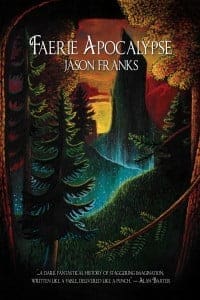 Scott – Who knows. Maybe ultimate power is right around the corner! Your latest creation, Faerie Apocalypse, is a tale about mortals crossing into the realm of the Fae. What kind of research did you have to do for this piece?
Scott – Who knows. Maybe ultimate power is right around the corner! Your latest creation, Faerie Apocalypse, is a tale about mortals crossing into the realm of the Fae. What kind of research did you have to do for this piece?
Jason – I went to fairyland with a camera and a notepad. The camera didn’t work.
My research for this was reading a lot of other books in which the characters go adventuring in fairy land, or some facsimile thereof. I learned to read on this material (Enid Blyton’s Faraway Tree books), so I think I know my way around the genre pretty well by now.
Faerie Apocalypse is about how stories grow across genres and media and culture, from the writers to readers (writers are also readers) and how this process makes them real in a way that is remarkable for a pack of lies. I also did a small amount of research into UK geography—I travelled there a couple of times! — which Alan Baxter then kindly corrected for me.
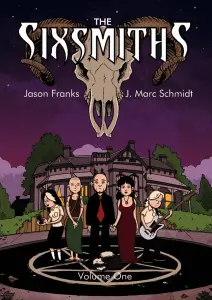 Scott – Learning to read while learning about fairies sounds like a good way to gain ingrained knowledge. That’s surprisingly common in speculative fiction authors. I see that you’re in the graphic art space as well. The Sixsmiths is a graphic novel about Satanists who’ve fallen prey to the global recession. How did you get into graphic novels, and what does the creative partnership between yourself and J. Marc Schmidt look like?
Scott – Learning to read while learning about fairies sounds like a good way to gain ingrained knowledge. That’s surprisingly common in speculative fiction authors. I see that you’re in the graphic art space as well. The Sixsmiths is a graphic novel about Satanists who’ve fallen prey to the global recession. How did you get into graphic novels, and what does the creative partnership between yourself and J. Marc Schmidt look like?
Jason – I got into comics as a reader pretty late—I think I was seventeen or eighteen. At that point, I already knew that I wanted to be a writer. I also wanted to be an artist, although not to the same degree. Comics at that time were full of fresh (to me) new voices and stories for a while there I found I was enjoying them better than I was prose fiction.
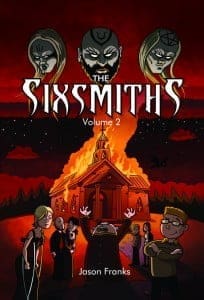 I first encountered J. Marc while messing around on some comics web forums in the early 2000s. J. Marc wanted to draw something short and I had a script I’d been messing with and the next thing you know, the pages arrived in my mailbox. I was living in the US then, and Marc was in Germany. I didn’t even know his real name until the pages arrived. And those pages were amazing! I’d never really thought about writing for another artist before that but I was immediately hooked.
I first encountered J. Marc while messing around on some comics web forums in the early 2000s. J. Marc wanted to draw something short and I had a script I’d been messing with and the next thing you know, the pages arrived in my mailbox. I was living in the US then, and Marc was in Germany. I didn’t even know his real name until the pages arrived. And those pages were amazing! I’d never really thought about writing for another artist before that but I was immediately hooked.
- Marc was my primary collaborator from 2003 until 2010. Usually, we worked in a pretty traditional way—I’d write a full script and he’d take it away and draw it. Then I would letter (and sometimes colour) the work and prep it for print. Sometimes, we worked Marvel Method. Occasionally he’d just send me pages and ask me to write dialogue for them. Still others, he’d write dialogue as well, and I’d just edit it and drop it into lettering. J. Marc sold a couple of solo graphic novels before I had any real published comics work and is more than capable of writing his own material, so I very was lucky to have the chance to work with him.
Scott – It sounds like lurking around forums and searching for the secret to life might just pay off for all of us, one day. Speaking of, I always ask: What kind of advice would you give to writers looking to get their work out there?
Jason – Just to stick with it. Occasionally, someone gets lucky and gets huge immediately but for most writers – myself certainly included – it takes a long time to get good enough and a long time to find recognition, much less success. If you’re not prepared to go the distance you’re probably wasting your time.
There are a lot of shortcuts you can take. Anybody with a word-processor and an internet connection can publish a book these days but, regardless of whether you are a traditionally published author or an indie, or something in between, you still have to do the work. Learn the craft, write the book, edit and polish it. Learn to talk about it in a professional way.
Also, while it’s important to pay attention to the market, it’s just as important to have some fun. You’re not going to stumble into the next monster hit by doing what everyone else does. Don’t be afraid to go your own way.
Scott – Good advice. From amateur author to present, what did your writing journey look like?
Jason – It feels like my whole career has been on the repêchage if I can use a sporting analogy. I tend to flub the opening rounds of the competition and then have to fight my way back into contention the hard way. I’m the John McClane of Australian genre fiction.
I started out a prose writer and then made a shift into being primarily focused on comics. Then it swung back to being about fifty-fifty and now I’m writing mostly prose again. This is based on personal circumstances as much as on opportunity—I have a young child and that has eaten up the time I have for the kind of project management overheads needed to make comics. With prose, I can usually just sit down and write.
Scott – Suddenly, writing sounds like more of a “yippee-ki-yay” situation. Do you have a daily process to keep you motivated when you sit down to write?
Jason – I’ve never had a daily process. Right now, I’m so time poor that any free moment I get for writing is a precious commodity — no additional motivation required.
When I was younger and had actual free time, my trick was to have two big projects going at once. I would switch between them whenever I felt myself flagging. That kept me fresh and I think made me at least fifty percent more productive than I would have been otherwise.
Nowadays I have less time, and I have ten projects competing for attention and wearing me out. I’m currently trying to streamline all of my processes in the hope that one day I’ll be able to sleep again.
Scott – I’m imagining you as one of those plate spinners that I’d see in a circus. You seem to collaborate with other authors and artists frequently. You recently worked with Greg Vondruska to put together a collection of stories. You were interviewed in the Beyond the Words podcast. How do you find those opportunities?
Jason – Greg is an old friend and that collaboration happened because we were working on the same project with a big group of others — completing the autobiographical graphic novel written by the sadly missed Ed Siemienkowicz, a mutual friend. That went really well, and Greg and I are now working up something bigger together. It’s a crime-noir comic called Quick. But originally, that just came out of community networking. I met some local comic creators when I was living in the States and Greg was a friend of theirs (and so was Ed).
Holly from Beyond the Words approached me to be on the podcast — I guess she read about Faerie Apocalypse somewhere or heard about it from a friend. Once you’ve been around for a while, people start to know who you are. I got some coverage in The Guardian when a reporter saw me speaking at a convention. So really, just get out into the real world, not just the virtual, and make yourself known.
Scott – So not just the internet forums, then! In closing, what’s one excerpt from your work that you feel most defines you as an author?
Here’s a bit from Faerie Apocalypse. While this book is quite stylistically distinct from most of my prose fiction, which is pretty lean, I think this little sequence gives a good look at the kinds of characters that I like to write. Here we meet the Queen of the Ore-lands, who is one of my favourite characters in the book. A monstrous character who fills out her role as the story requires–but you can see the straining to contain her. She is, I think one of the few characters in the book who is genuinely worthy of sympathy.
The Queen of the Ore-lands was tall and slender and pale. Her raiment was cast from a dozen different metals, secured to her flesh with chains and welds and rivets. The skin of her cheeks had been peeled-back and secured with wire stitches, revealing too many rows of silver teeth.
The Queen shook out her iron-grey hair and rose from her throne. When she grinned, he could see her teeth from three orifices. “Mortal man, you have been granted audience.” Her voice was like a hammer on an anvil.
The mortal put down his rucksack and bent to one knee. “Majesty.”
The Queen’s gauntleted hands clattered as she brought them together. “My time is valuable,” she said. “What do you seek?”
“Majesty, I seek the most beautiful thing in the world,” he said, keeping his gaze fixed on his bootlaces.
The Queen raised one ring-pierced, chain-threaded brow. “Indeed?”
“Indeed, Majesty.”
“In what form, pray tell, do you expect to find this… object?”
“She is a Queen of the Faerie.”
The Queen’s smile did not waver. “Well? Have you found her?”
“The intricacy and skill of the work that has been wrought upon your Majesty is a marvel—”
“Answer the question,” said the Queen, through her hideous grin. “Am I the most beautiful thing in the world?”
He looked right into her ball-bearing eyes and said: “I find your Majesty to be profoundly ugly.”
The Queen threw her head back and laughed; so long and so loud that the walls of the throne room resonated in sympathy. Her minions smirked amongst themselves.
When she had recovered herself, the Queen of the Ore-lands brushed the hair from her eyes with a movement that was fetching in its economy. She licked her lips and shook her head and said: “I like you, mortal. Ask of me a boon, and I will grant it.”
Scott – Where can people go to follow you and find out more about your work?
Jason – I am very easy to find on the internet:
Website: http://www.jasonfranks.com
Facebook: https://www.facebook.com/FranklyOperational/
Twitter: https://twitter.com/jasefranks.
Please don’t come follow me to my actual house or work; the police are already suspicious of me.











